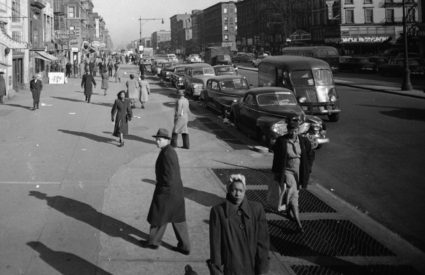
Often overlooked in America’s history of World War II are the 27 Tuskegee Airmen who disappeared in combat. Geoff Bennett…

Our May 2020 pick for the PBS NewsHour-New York Times book club is Ann Petry's "The Street," chosen by novelist Tayari Jones. Become a member of the Now Read This book club by joining our Facebook group, or by signing up to our newsletter. Learn more about the book club here.
Among the many racial and socioeconomic disparities laid bare by the current coronavirus pandemic are the unequal risks and hardships facing service workers, who are more likely to face exposure to the virus while performing essential jobs, or to lose income amid the dire economic straits, all while juggling the demands of home.
In Ann Petry's 1946 novel "The Street," which chronicles an African American woman's pursuit of the American dream, the main character's predicament is not unlike that of many workers today. Lutie Johnson takes a job caring for Little Henry Chandler, the child of a wealthy white family in Connecticut.
In what writer Tayari Jones notes is a "most prescient passage" of Petry's book, the child's father "could afford to hire a Lutie Johnson," because he makes money manufacturing "paper towels and paper napkins and paper handkerchiefs," a service that is profitable "even when times are hard."
"When Lutie adds 'a' before her name," observes Jones, it underscores the fact that "she doesn't think of herself as an individual, but as a generic member of a class of women who work as maids."
Yet Lutie, well aware of the class she occupies, is constantly striving for higher — dreaming, for example, of one day owning a certain kitchen sink she sees in an advertisement, not unlike the home trappings we may yearningly observe in others' Instagram feeds or Zoom backgrounds today.
But her aspirations are secondary to the demands of tending to her own family and the Chandlers while her husband struggles to secure a job. "As we are facing unemployment numbers not seen since the Great Depression, scores of Americans are facing the desperation and loss of dignity that comes along with losing work," Jones writes of the Johnsons' struggle. "'The Street' was published in 1946; it's a shame that it feels like it was written just yesterday."
Jones shares more of her takeaways from the novel in an annotated excerpt below.
…against the sky that was equally beautiful in snow or rain or cold, clear sunlight. Sometimes she took Little Henry Chandler to the post-office with her and she couldn't help thinking that it wasn't right. He didn't need her and Bub did. But Bub had to do without her.
And because Little Henry Chandler's father manufactured paper towels and paper napkins and paper handkerchiefs, why, even when times were hard, he could afford to hire a Lutie Johnson so his wife could play bridge in the afternoon while Lutie Johnson looked after Little Henry. Because as Little Henry's father used to say, 'Even when times are hard, thank God, people have got to blow their noses and wipe their hands and faces and wipe their mouths. Not quite so many as before, but enough so that I don't have to worry.'
Her grip on the subway strap tightened until the hard enameled surface cut into her hand and she relaxed her hand and then tightened it. Because that kitchen sink in the advertisement or one just like it was what had wrecked her and Jim. The sink had belonged to someone else–she'd been washing someone else's dishes when she should have been home with Jim and Bub. Instead she'd cleaned another woman's house and looked after another woman's child while her own marriage went to pot; breaking up into so many little pieces it couldn't be put back together again, couldn't even be patched into a vague resemblance of its former self.
Yet what else could she have done? It was her fault, really, that they lost their one source of income. And Jim couldn't get a job, though he hunted for one — desperately, eagerly, anxiously. Walking from one employment agency to another; spending long hours in the musty agency waiting-rooms, reading old newspapers. Waiting, waiting, waiting to be called up for a job.
Sustain our coverage of culture, arts and literature.